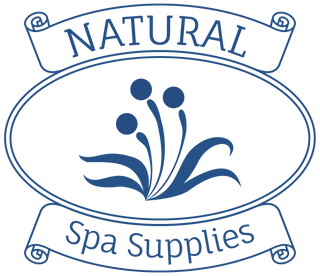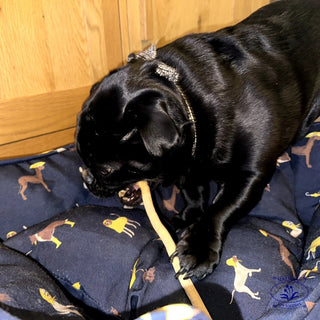Keeping your dog's teeth clean is a crucial aspect of their overall health and well-being. It can be a struggle cleaning your dog’s teeth with a conventional pet toothbrush, and it is very difficult to assure you have cleaned the inner surfaces sufficiently. What if, you could teach your dog to clean its own teeth in a way that every tooth surface was cleaned, in just one minute?
Have a read of our training tips and see why it is so important to teach your dog how to care for its own teeth. You will find that dogs enjoy cleaning their own teeth, much more than us humans trying to do it for them. Our tips come from many year’s experience, introducing our organic tree grown toothbrush sticks to puppies and both young and old dogs. We have been able to observe how even old dogs can learn to use these sticks effectively in a single session. However in our training advice below we have divided the training into 3 sessions. If you have a very clever dog, you could skip straight to session 3.
Unpacking and Introducing Miswak Sticks for Dog Dental Care
We have two types of dental stick which are suitable for dogs - organic Miswak Sticks and organic Olive Tree Sticks.
Miswak are tree roots which are about 20cm long and come in a variety of thickness. They are the world’s most popular fully natural toothbrush and their usage must go back for thousands of years.
Olive Sticks are also about 20cm long but much thinner. So these would be a good option for miniature and small dogs.
The sticks have different flavours. The olive sticks are mild and taste earthy. The miswak sticks, have a robust aroma of horseradish or mustard!
To ease your dog into this new oral care routine, if the aroma is too strong, you have a few options. Let the stick air dry to reduce the strong flavour; use it yourself a bit first, or soak it in water for a few hours then let it dry out a bit. Once your dog gets familiar with miswak you will no longer need to do this, and some dogs will take to a fresh miswak stick straight away. The Olive sticks, on the other hand, are milder and ready for immediate use.
Obtain your tree dental sticks!
Training your Dog How To Clean its Own Teeth
First Training Session: I would suggest walking around a bit casually holding the stick in your hand. The dog will notice and will already want to take it. You might repeat your action until you are sure you have engendered a high level of curiosity.
Then wiggle the stick and the dog will for sure come over to investigate. Keep hold of the stick and let the dog nibble it or lick it. Praise the dog. Put the stick away. Maybe repeat after a few minutes and also later on. Then play the dog’s favourite game.
Second Training Session: Get the dog interested in the stick, and let the dog nibble one end of the stick or lick the stick for 10 seconds or so. Praise the dog. Remove the stick. You might have to offer a reward to get the stick back. Repeat. Then play the dog’s favourite game.
Third Training Session: Once again make the stick intriguing. Encourage the dog to lay down. This time gently place the stick between its paws and guide the nibbled end of the stick towards the dogs mouth. Encourage the dog to take over - holding the stick between its paws and chewing one end! One minute is plenty. Most dogs will learn on their own to drop the stick after having used it for a short while and you will be able to praise the dog and collect and care for the stick.
After the dog has cleaned its teeth, remove the stick, wash it and trim any loose bristles from the head of the stick.
WARNING Always supervise the dog while it is using the stick and only allow them to nibble it for a minute or less.
Why is it Important for the Dog to Clean it Teeth Everyday
- Prevention of Dental Issues: Regular teeth cleaning helps prevent common dental problems in dogs, such as periodontal disease, gingivitis, and tooth decay. This can contribute to your dog's long-term oral health.
- Improved Breath: Dental care reduces the buildup of plaque and tartar, which are common contributors to bad breath in dogs. Regular cleaning helps keep your dog's breath fresh.
- Prevention of Tooth Loss: Periodontal disease, if left untreated, can lead to tooth loss in dogs. Routine dental care, including cleaning, can help prevent the progression of dental issues and preserve your dog's teeth.
- Pain Prevention: Dental problems can cause pain and discomfort for dogs. Regular cleaning helps identify and address potential issues early on, reducing the likelihood of pain associated with dental conditions.
- Enhanced Overall Health: Poor oral health in dogs has been linked to various systemic health issues, including heart, liver, and kidney problems. By maintaining good oral hygiene, you contribute to your dog's overall health and longevity.
- Prevention of Infections: Dental issues can lead to infections in the gums and mouth. Regular cleaning helps minimize the risk of infections, which can be painful and may require expensive veterinary intervention.
-
Financial Savings: Preventive dental care, including regular cleanings, can save you money in the long run. It is more cost-effective to invest in preventive measures than to treat advanced dental problems that may require extensive veterinary procedures.
An annual clean at the vets can cost anything from £150-£500 as it needs to be done under general anaesthetic. The bill can rise if problems are found and extractions or specialist treatment is required. Smaller dogs, with smaller teeth, have more dental issues and may need to have their teeth inspected and cleaned more regularly. - Better Nutrient Absorption: Healthy teeth and gums contribute to better chewing and digestion. This ensures that your dog can properly break down and absorb nutrients from their food, promoting overall health.
- Improved Quality of Life: Dogs with good oral health are likely to be more comfortable, happier, and have an improved quality of life. They can eat, play, and interact without the discomfort caused by dental problems.
It's important to note that dental care for dogs goes beyond cleaning at home. Regular veterinary check-ups, professional cleanings, and appropriate dental treats or toys can also contribute to maintaining your dog's oral health. Always consult with your veterinarian for personalized advice on the best dental care routine for your specific dog.
Toothbrushing with Tree Sticks is Instinctive in Humans and Dogs
I recommend that pet owners do try these toothbrush sticks themselves before introducing them to your dog. It helps owners to appreciate how these tree sticks work and what they do. We send full instructions for human usage with each order, and using it is really easy.
After just a single session, you will notice how clean the teeth feel and even how they feel cleaner in between sessions. Used regularly, the teeth feel less sensitive – it is because the natural compounds in these toothbrush sticks start remineralising the enamel within minutes. This can certainly help adults when their enamel begins to thin and when dentine is exposed due to gum recession.
I recommend that pet owners do try these toothbrush sticks themselves before introducing them to your dog. It helps owners to appreciate how these tree sticks work and what they do. We send full instructions for human usage with each order, and using it is really easy.
Toothbrushing with Your Dog
After having tried the Miswak and Olive Sticks yourself, you will want to share these benefits with your dog. Make sure they have their very own tree stick toothbrushes.
You might even develop a routine - While your dog is brushing its teeth with its toothbrush stick, you could give your teeth a quick clean with your own toothbrush stick?
Make sure that you use your sticks, and the dog uses its own sticks. You don't want to muddle them up!
If you try to develop the toothbrushing into a regular routine, such as before bedtime - your dog will even remind you if you forget!
To help with your choice, the olive sticks are not graded by size – they are all quite thin, while our miswak is graded into thin, medium or thick.
Tip: For small dogs select the medium thickness miswak or olive sticks.
For medium or large dogs select the medium or thick miswak.
Remember: Your role is to offer the stick, supervise for one minute, take the stick back, wash and trim it and then keep the stick in a safe place away from the dog.
It is easier than you think to train your dog to clean its own teeth in a one minute routine.
The use of these sticks is totally instinctive – although a little guidance from you goes a long way to getting the best use from the stick.
All these photos of this black pug learning to use the Miswak Stick were taken in one evening - this pug is smart, learning everything it needed to know in one session!
Join the ‘tree toothbrush revolution’ Try these toothbrush sticks yourself and then teach your dog how to brush its own teeth. Please share these benefits with your dog owning friends and your dog’s ‘doggie’ friends.
Purchasing Miswak and Olive Sticks. Use the buttons below.
Please visit our website to learn about our entire range of natural dental products, then select the type and number of Miswak or Olive sticks you require. Or alternatively call us to order on either our landline 01508 486715 or our freephone number 0800 023 5008 during office hours.
Do feel free to email us photos or video clips of your dog using these sticks. We’d love to see how they are getting along.


